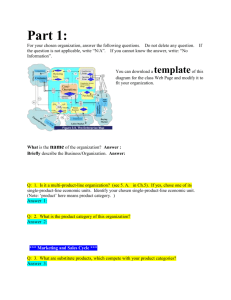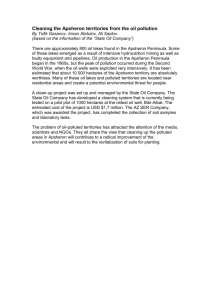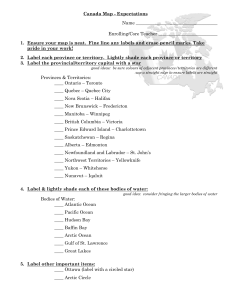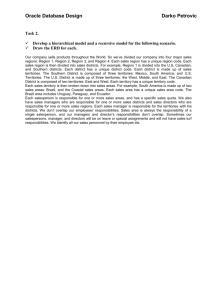(c) crown copyright Catalogue Reference:CAB/129/58 Image Reference:0028
advertisement
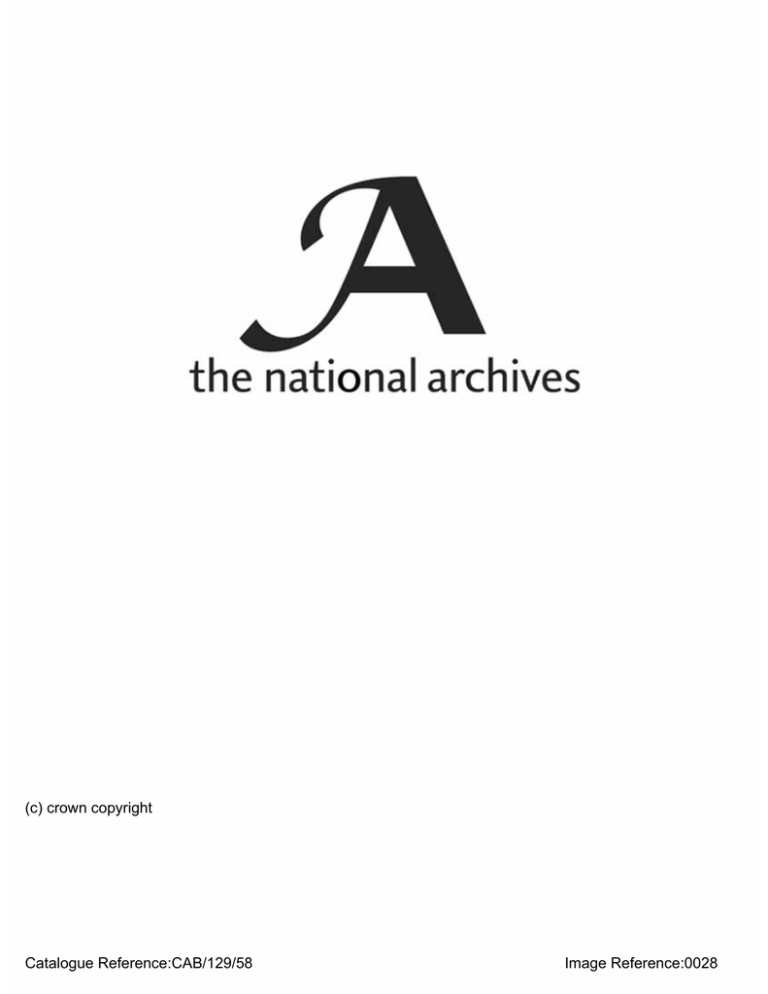
(c) crown copyright Catalogue Reference:CAB/129/58 Image Reference:0028 Printed for the Cabinet. January 1953 Cdpy No. SECRET C. (53) 28 26th January, 1953 CABINET CENTRAL AFRICAN FEDERATION MEMORANDUM BY THE SECRETARY OF STATE FOR COMMONWEALTH RELATIONS AND THE SECRETARY OF STATE FOR THE COLONIES It is proposed that United Kingdom Ministers aftd the Prime Minister of Southern Rhodesia and the Governors of Northern Rhodesia and Nyasaland should sign the Preface to the White Paper in the same way as was done on the last occasion, and this will be published as the Declaration on behalf of all Govern­ ments in introducing and recommending the Scheme^ W e think therefore that the Cabinet should see the Preface we propose to sign.- The draft has been approved in its main principles by the' Plenary Session and has also been approved by the Special Drafting Committee of all Delegations. It has to finally adopted by the Plenary Session on Monday afternoon but we do not anticipate that anything except verbal alterations will be made in it; 1. The urgency is that, in order to keep to the timetable.; this must be in the printers' hands by Wednesday. SWlNTON, O; L. 26ih January, 1953. 43593 63 THE FEDERAL SCHEME The year 1953 is one of opportunity in Central Africa. Ever since the report of the Bledisloe Commission in 1939, the desirability of closer association of the Central African Territories has been canvassed in one form or another. The importance of the objective has been generally accepted, but there were wide differences of opinion as to how it should be achieved. The realisation alike of the importance of the subject and of its increasing urgency led the late Govern­ ment to embark on an intensive attempt to find a final solution. Starting with the official enquiry in 1951* there has been a succession of conferences, visits, commissions and reports over the last two years. These have now culminated in the conference of the Governments of the United Kingdom, Southern Rhodesia, Northern Rhodesia and Nyasaland which has been meeting in London since 1st January and which has reached agreement on the whole matter. Closer political association between the three Central African Territories is essential if they are to develop their resources to the full and reach their proper stature in the world. Individually the Territories are vulnerable. Their individual economies are ill-balanced and ill-equipped to withstand the strong economic pressures of a changing world. Of the three Territories only Southern Rhodesia has any significant secondary industries. Northern Rhodesia is very largely dependent on her copper industry, which provides over four-fifths of her exports. Nyasaland, an agricultural community, has to rely too much on a few primary products such as tobacco, tea and cotton and cannot develop herself unaided. The economies of the three Territories are largely complementary; their closer associa­ tion is essential if they are to achieve the economic and social development of which they are together capable. All this is common knowledge and common ground. How is it to be achieved? It has been suggested that this could be done by consultative machinery; but the hard experience of the last few years, acquired through the working of the Central African Council, has conclusively disproved this. With the greatest goodwill between the Territories it has been found impossible by such methods alone to secure a harmonious and effective programme of economic development of the whole area. N o one Territory can be expected to subordinate its own interests to those of another Territory for which it has no responsibility and with which it is not politically associated. Competing local demands for labour and scarce materials hamper the wider development of the Central African economy. Development of the largely untapped resources of this potentially wealthy area demands the combined efforts of the three Territories acting together. The right thing must be done in the right place. There are railways to be built; there are rivers to be harnessed; power must be developed to meet the needs of industry; food production must be expanded to meet the ever-growing needs of a steadily increasing population. Enterprises which would serve each and all the Territories cannot be undertaken because common policy cannot be made effective in action. Such development requires expenditure of capital and material resources on a large scale. Only a well-balanced 'and co-ordinated economic unit would be able to attract development capital from outside without which these opportunities cannot be realised. All the inhabitants of the three Territories would benefit if an effective central authority could take major economic decisions in the interests of the whole area. What form should this authority take? Here we are faced with the fact that the Territories are at very different stages of constitutional development. Amal­ gamation, which would mean a single self-governing State, is not possible because Her Majesty's Government must maintain their special responsibilities to the Northern Territories. On the other hand any looser form of association, such as a league or an organisation similar to the East African High Commission and Central Assembly, would not give the central authority sufficient financial and economic power to enable it to achieve the essential objects. Thus, only in a Federation on the lines set out in the Scheme which we have now prepared can the solution be found; in this, we believe, lies the best hope of strengthening that co-operation and partnership between the races and Territories without which their peoples cannot attain a full measure of well-being and contentment. The Federal Scheme is fully set out in a separate White Paper, Here we draw attention to its main features. It provides for a true Federation. Its object is to create a strong central authority, compatible with the state of political development of the three Territories and having the necessary power to co-ordinate the economic life of the area. This it does, while reserving to the Governments and Legislatures of the individual Territories the political and financial pov/ers which they must retain to enable them to discharge the important duties and responsibilities which remain within their control. T o achieve this end the legislative powers have been divided in the following manner. Those matters which are clearly of common interest and which in the interests of the whole area the Federation must handle alone are set out in the Exclusive List. On these, only the Federal Legislature can make laws. Matters over which the Federation and the Territories may both need to have some jurisdiction are set out in the Concurrent List. These can be dealt with both by Federal and by Territorial law. All those matters not dealt with in either list remain the responsibility of the Territories. They include those matters most closely affecting the daily life of the African people. Thereby a further object of the scheme is ensured, namely, that the Territorial Governments remain responsible for discharging their special obligations to their peoples, particularly in questions of land and Territorial political advancement. A t the very outset the preamble recites the fact that the Colony of Southern Rhodesia would continue to enjoy responsible government in accordance with its Constitution; Northern Rhodesia and Nyasaland would continue, under the special protection of Her Majesty, to enjoy separate Governments; the association of the three Territories would enable the Federation, when the inhabitants of the Terri­ tories so desire, to go forward with confidence towards the attainment of full membership of the Commonwealth. As under the original draft Scheme, there will be an African Affairs Board. The Board will have the same powers as those provided under the original Scheme but it is brought within the framework of the Federal Parliament instead of being a body outside it. It will have two members from each Territory, one European and one African, drawn from those members of the Federal Legislature who have been specially elected or appointed to represent African interests. The Board will take its place in the Constitution as a Standing Committee of the Legislature. W e are agreed that this is a marked improvement on the previous proposals. W e can now be sure not only that the European members of the Board will be highly qualified for their task but also that the Africans themselves will have a voice in the selection of the African members and so will be able to play their part in seeking to ensure that they are men well qualified to represent African interests. The primary function of the Board is to watch and safeguard the interest of Africans in matters of legislation. For this purpose it is highly desirable that the members of the Board should not merely watch from outside, but should be able themselves as members of the Legislature to take their full part in the Parliamentary debates on any legislative proposal at all stages. By composing the Board of members of the Legislature, and by constituting it as a Standing Committee, a method has been devised which will not only give members of the Board full scope for the effective discharge of their duties, but will also enable this to be - done in a manner which accords more closely with the normal and proper constitutional procedure of a Parliament. This improvement is also a complete answer to the valid criticism that, by creating a Board outside Parliament as well as members for African interests inside Parlia­ ment, we were unnecessarily duplicating functions and creating the certainty of overlapping and the possibility of friction. T o give the new Federal State time to establish itself, and to build up confidence in the Federation among all the peoples of the Territories, provision has been made that, for a period of ten years after the Constitution comes into force, there shall be no change in the division of powers between the Federation and the Territories except with the consent of all three Territorial Legislatures. Towards the end of that period Her Majesty's Government in the United Kingdom, the Federal Govern­ ment and the three Territorial Governments will review the Constitution. During the Conference the United Kingdom representatives were asked what would be the attitude of the United Kingdom Government and what further action the United Kingdom Government would take in the event of this Scheme of Federa­ tion being rejected. They stated definitely that the United Kingdom Government had not entertained and would not entertain any proposal for the amalgamation of the Territories in whole or in part. Moreover, more than two years had now been spent on intensive study of this matter and on evolving a Scheme of Federation which the representatives of all the Governments believed to be the best and most practical solution they could find. If this Scheme should be rejected the United Kingdom Government would see no prospect of re-^opening the subject within any foreseeable period of time. We have reached the moment for decision: We are convinced that a Federa­ tion on the lines proposed is the only practicable means by Which the three Central African Territories can achieve security for the future and ensure the well-being and contentment of all their peoples. We believe that this Federal Scheme is a sound and a fair scheme which promotes the essential interests of all the inhabitants of the three Territories and that it should be carried through. (Signed) [Here will be appended the signatures of the Lord President of the Council, the Secretaries of State,- the Prime Minister Of Southern Rhodesia and the Governors of Northern Rhodesia and Nyasaland.I

